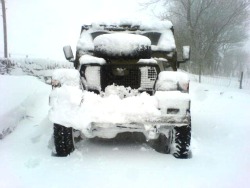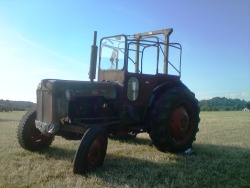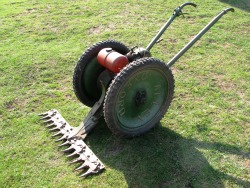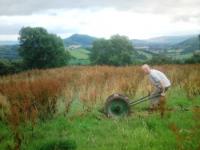Land-Rovers, tractors and things
LAND-ROVERS, TRACTORS AND THINGS
Certain old machines seem to belong at Tair-Ffynnon: Land-Rovers, tractors like Fordsons or little grey Fergies, and gadgets like the Allen Scythe select themselves. Why? In Louis Armstrong’s words (when asked what jazz was): ‘If you gotta ask, you ain’t never gonna know’.
 Our old Land-Rover I bought when I was still working in London—to park in the street so every time I passed it, morning and evening, it would remind me that one day I was headed into the wild. It’s a Series III Army lightweight, stripped-down to sling beneath a helicopter—all a gigantic cock-up, because by the time it was in production, helicopters could carry standard Land-Rovers. It’s a terrific machine, though; grips better in snow than most more powerful 4x4s and has got us out and home many times when nothing else would have done. You can take the top off, clamber over it, push and tow things, so children adore it. Critically, in the right conditions it emits that incomparable old Land-Rover smell of wet mud on hot exhaust.
Our old Land-Rover I bought when I was still working in London—to park in the street so every time I passed it, morning and evening, it would remind me that one day I was headed into the wild. It’s a Series III Army lightweight, stripped-down to sling beneath a helicopter—all a gigantic cock-up, because by the time it was in production, helicopters could carry standard Land-Rovers. It’s a terrific machine, though; grips better in snow than most more powerful 4x4s and has got us out and home many times when nothing else would have done. You can take the top off, clamber over it, push and tow things, so children adore it. Critically, in the right conditions it emits that incomparable old Land-Rover smell of wet mud on hot exhaust.
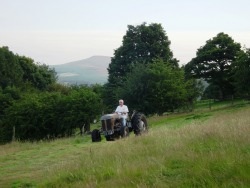  The more I thought about it, the more obvious it became that an old tractor was just what Tair-Ffynnon was missing. The more I thought about it, the more obvious it became that an old tractor was just what Tair-Ffynnon was missing.
‘Why?’ said Vez.
It was one of those typically female questions that, on the spot, it’s surprisingly difficult to answer. Arguments that a tractor was self-evidently a Good Thing to have, that it would lend tone to the place, in our straitened financial circumstances, lacked weight. ‘For towing and mowing and pulling stuff. For cutting logs … everything.’ My answer was necessarily vague, as I wasn’t absolutely sure myself of all the myriad uses to which an old tractor might be put.
‘You can buy a lot of logs for the price of a tractor,’ said Vez. ‘How much does a tractor cost?’
‘Well, you could probably get an old Fergie or a Fordson for about £1,000, but I should think …’
‘A grand! A grand! Are you out of your mind? When we haven’t even got a dry place to store anything. And Maya needs shoes.’
There’s no arguing such a case. Chapter 4, A short detour about wood-chopping
|
Has there ever been a more magnificent garden machine than the Allen Scythe? Made between 1935 and 1973 by the Allen company of Oxford, ‘Wherever A Man Can Walk, An Allen Scythe Can Cut’ boasted the promotional blurb.
Ours is the two-stroke version, bought for £40; the engine chugs and pops as the blades chatter and clatter. It has a sticky clutch, so it yanks my arms with a mind of its own and won’t always stop—reminding me of the owner who, helpless behind his runaway beast, aimed in desperation at some park railings, only to find it slice clean through them.

The 12-page instructions booklet makes no mention of health or safety. A teacher once told me of someone who, freeing something from the blades of his Allen Scythe, lost a finger. Remembering that if he got to hospital soon enough, they might be able to stick it back on, he was reaching down to get it … when the dog got it. The idea was ripped off by the film Kiss Kiss Bang Bang (2005).
All photographs and text except where otherwise stated © Antony Woodward and Verity Woodward.
